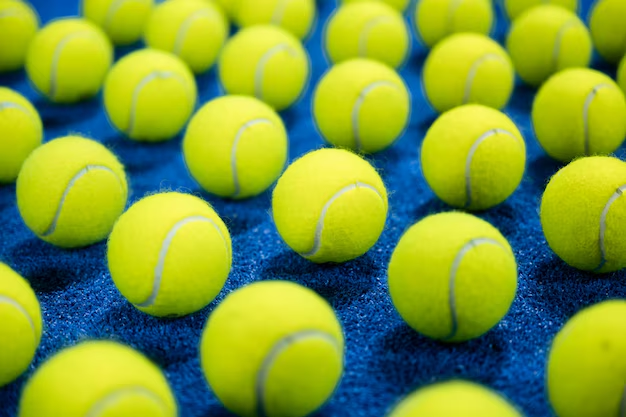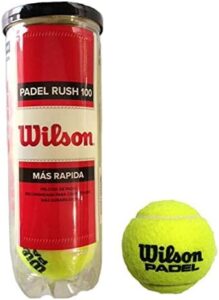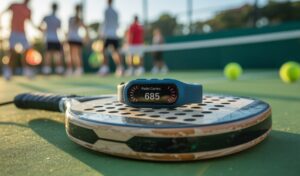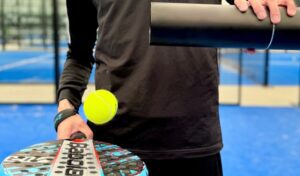Choosing the best padel balls are important for making the most out of your game experience and performance. There are many different brands and types to choose from, making it difficult to know which balls best fit your playing style and conditions. This guide works to equip you with the info you need to make an educated choice.
What Makes the Best Padel Balls?
At first glance, padel balls might look almost identical to tennis balls – but don’t be fooled. The best padel balls are specifically engineered to meet the unique demands of the sport, offering consistency, durability, and optimal bounce for competitive and recreational players alike.
Key Specifications of Padel Balls
According to the International Padel Federation (FIP), padel balls must adhere to a strict set of standards to ensure fair play and consistent performance:
Dimensions and Mass
Padel balls must have a diameter between 6.35 and 6.77 cm, and a mass ranging from 56.0 to 59.4 grams. These specifications help maintain a balance between control and power during rallies.
Pressure and Bounce
The internal pressure of a padel ball should be between 4.6 and 5.2 kg per 2.54 cm². When dropped from a height of 2.54 meters, a quality padel ball will bounce between 135 and 145 cm. This regulated bounce is crucial for maintaining rhythm and timing during fast-paced exchanges.
Color
To ensure maximum visibility during gameplay, the best padel balls come in high-contrast colors – typically yellow or white, that stand out clearly against the padel court’s surface.
Why Choosing the Best Padel Balls Matters?
Selecting the right padel balls is more than just grabbing the first pack you find on the shelf. Whether you’re training, competing in tournaments, or enjoying a weekend match with friends, the ball you use directly affects your experience.
The best padel balls offer:
- Consistent bounce across varying temperatures and court surfaces
- Durability, even during extended, high-impact play
- Pressure retention to avoid flattening too quickly
- Reliable spin control for advanced shot-making
With so many brands and types available – from pressurized to non-pressurized options, it’s no surprise that picking the perfect ball can be a challenge. Factors like altitude, indoor vs. outdoor play, and even your playing style can influence which padel ball performs best for you.
If you’re aiming to upgrade your game, investing in the best padel balls for your skill level and match environment is an easy win.
What to Look for in the Best Padel Balls?
When you’re on the hunt for the best padel balls, it’s not just about picking any set from the shelf. The right ball can significantly impact your gameplay, consistency, and even enjoyment on the court. Whether you’re a casual weekend player or a competitive regular, here’s what you need to consider:
Playing Surface Compatibility
Padel is played on different court surfaces – artificial grass, concrete, or synthetic materials. The best padel balls are those that complement your regular playing surface. For instance, balls that perform well on synthetic grass may not bounce the same way on harder courts. If you often switch between surfaces, look for versatile, all-court options.
Altitude and Climate Adaptability
Did you know that padel ball performance changes with altitude and temperature? At higher altitudes, the air pressure is lower, which can cause balls to bounce more and travel faster. In warmer climates, balls may expand and feel “livelier.” That’s why top brands manufacture high-altitude padel balls or climate-specific options. If you’re serious about your game, choose balls designed for your local weather and elevation.
Durability and Construction
If you play often, investing in durable balls is key. The best padel balls are made with high-quality felt and rubber, allowing them to withstand intense rallies without losing pressure or bounce. Some premium models are engineered to last through multiple matches without sacrificing performance. Look for phrases like long-lasting pressure, reinforced core, or pro-level durability when making your pick.
Speed and Control Balance
Different padel balls are tailored for different play styles. Some offer extra speed, perfect for aggressive players who love fast-paced games. Others provide enhanced control, better for strategic players who focus on precision and placement. The best choice depends on how you play. If you’re still discovering your style, opt for balls that offer a balanced performance – speed, spin, and control in equal measure.
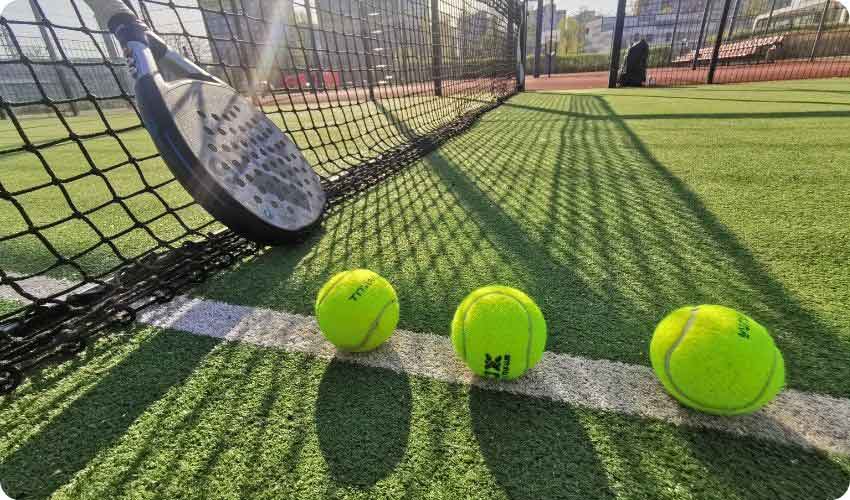
Top Padel Ball Brands
Certain padel ball brands are quality assured and approved by the FIP for use in tournament play. 15 brands approved by FIP as of 2025 include:
- All For Padel (Adidas)
- Babolat
- Bullpadel
- Contra Padel
- Decathlon
- Dunlop
- Four Sports
- Head
- Palbea
- Pro Kennex
- Renewaball
- Slazenger
- Tretorn
- Varlion
- Wilson
In-Depth Reviews of Our Recommended Best Padel Balls
Here are in-depth reviews of some of the best padel balls.
- Head Padel Pro: The Head Padel Pro is known for its consistent bounce and durability, making it a preferred choice among professional and amateur players alike. It is the official ball of the World Padel Tour, and it delivers the perfect combination of control and speed.
- Babolat ACE Padel: These Babolat ACE Padel balls are built for high performance. They offer great durability, a lively bounce and are perfect for play at a competitive level.
- Wilson Padel Rush 100: Popularized by many of Wilson’s Padel Rush 100 shells, their performance is great in a variety of playing conditions, and balance speed with control quite nicely.
Maintaining Your Padel Balls: How to Extend the Life of the Best Padel Balls
Investing in the best padel balls is just the first step toward consistent performance and enjoyable play. To get the most out of your padel balls and your money – it’s important to maintain them properly. Here are some practical tips to help extend the life and bounce of your favorite balls:
1. Smart Storage: Keep Them Pressurized
The internal pressure of a padel ball is what gives it that perfect bounce and responsiveness. Over time, balls naturally lose air, which leads to a dead or dull feel. One of the best ways to preserve the performance of your best padel balls is by storing them in a pressurized container or ball pressurizer. These handy tools help maintain internal pressure and can significantly increase the longevity of your balls between games.
2. Temperature Control: Avoid Heat & Humidity
Padel balls are sensitive to extreme weather conditions. Storing your padel balls in a cool, dry place, away from direct sunlight and moisture, helps prevent the rubber from degrading. Heat can cause the balls to expand prematurely, while humidity may damage the felt surface. If you’re serious about protecting your gear, consider a ventilated bag or storage area for optimal care of your best padel balls.
3. Smart Rotation During Play
Using the same ball for every point can cause it to wear out quickly and unevenly. A simple trick used by pros? Rotate multiple balls during play. Bringing 3–4 padel balls to each session not only helps maintain consistency in bounce and feel throughout the match but also reduces overall wear. This is especially important if you’re using high-performance or tournament-quality padel balls, as they are designed to maintain top performance for a longer stretch, if used wisely.
By following these tips, you’ll extend the lifespan of your gear and ensure that your best padel balls perform at their peak every time you step onto the court.
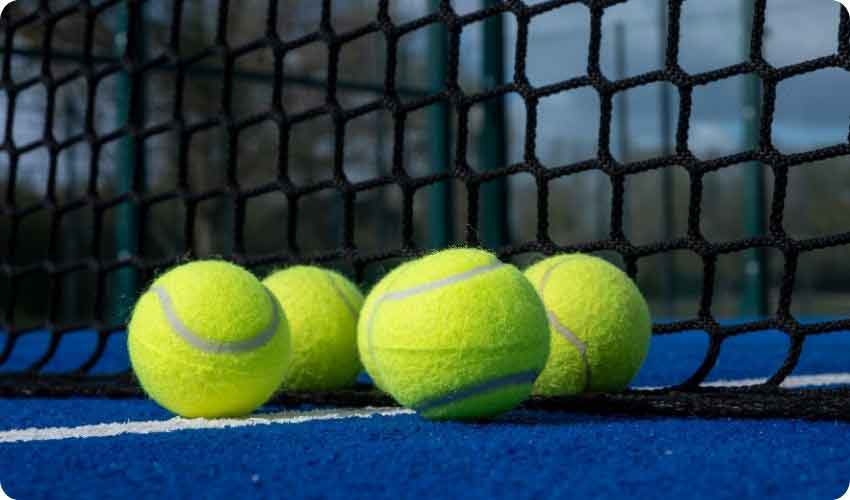
Conclusion
Maximize padel performance by selecting the right balls, prioritize court type, weather resistance, durability, and speed ratings. Always choose FIP-licensed brands for guaranteed quality. Make sure handling your balls correctly for a long service life and good playing characteristics on court.
Do you want to improve your Padel Game Plan? For additional insight of the sport and any Padel advice, keep your eyes peeled at PadelGamePlan.com!
FAQ – PADEL BALLS
How often should you expect to replace my padel balls?
Frequent players replace padel balls every 2-3 matches. Casual players can use them longer.
Are padel and tennis balls the same?
Padel balls differ from tennis balls in three key ways: lower pressure (12psi vs 14psi), smaller diameter (6.35cm vs 6.7cm), and felt designed for court surfaces.
Are there environmentally-friendly padel balls on the market?
Renewaballs lead the sustainable padel ball market – crafted from 100% recycled materials with FIP-approved performance.
FAQ – PADEL IMPROVEMENT
How to get better at padel?
You will need regular practice, hit on the walls and watch matches of professionals. Read this Article – How to play Padel Tennis.
How can I improve my Service?
For more information on Padel Service, please read the Article – Best Padel Serve Techniques
Can I know more about the Rules of Padel Tennis?
Absolutely, for a beginner-friendly explanation of the Rules of Padel Tennis, please have a look at the Article – Rules of Padel Tennis. For Official Rules, please download the official rules of Internatlonal Padel Federation here.
FAQ – PADEL FOR CHILDREN
At what age should children start Padel Tennis for children?
Children as young as 4 can start out with foam balls and mini-rackets. The majority of clubs are for ages 5–15.
How does padel improve teamwork in kids?
Doubles requires constant communication and mutual strategies; collaboration is natural.
Can padel help academically?
Doubles requires constant communication and mutual strategies; collaboration is natural.
What is a good reason why padel is safer than tennis for little kids?
Enclosed courts, slower balls, and lighter gear reduce injury risks significantly.
Is there any competitive padel opportunity for kids?
Absolutely! Try to look for Junior leagues that offer Padel tournaments for under-12 and teen divisions. the positive impact of padel tennis on children
FAQ – PADEL EQUIPMENT
Do I need special padel tennis attire?
Please read the Article – Top Padel Clothing Essentials.
Do you have a checklist of padel tennis essentials I’ll need?
Could you recommend which padel balls I should use?
Please read the Article – Best Padel Balls.
Planning a Padel Tournament?
Use our Free Tool and get the schedule in seconds.
FAQ – PADEL TENNIS COURT
Is it possible to erect a padel court in my garden?
Installation is possible with a minimum area of 10m × 20m, subject to local zoning approval. For more information, Read this Article.
How much the cost of a padel court?
A typical padel court can range from AED 335,000 to AED 1,113,000, depending on materials, location and amenities. See the full cost breakdown here: Article – How much does it cost to build a padel court.
What about lighting required for the padel court – what advice can you give on that?
Please have a read through on the Article – Essential Padel Lighting Tips.


